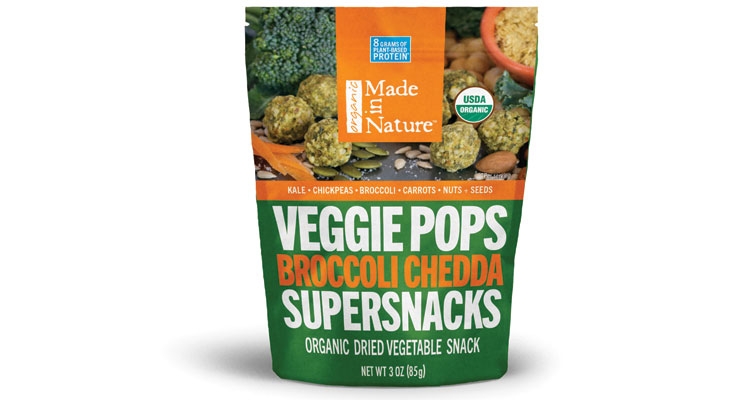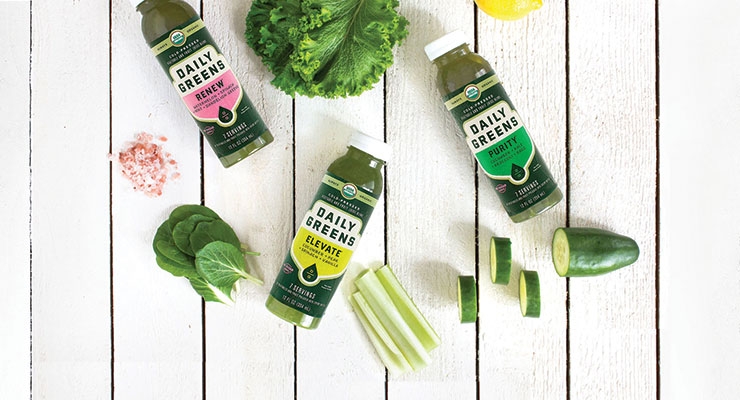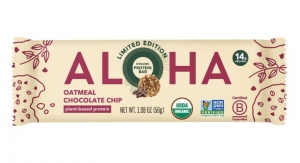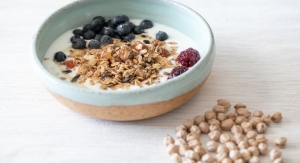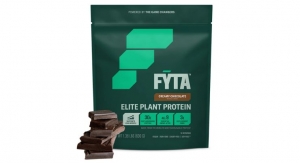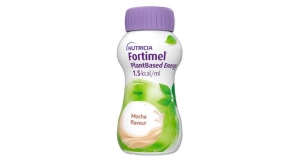By Sean Moloughney, Editor10.01.18
Plant-based foods and dietary supplements are trending up as more consumers reduce their meat intake and opt for a range of “green” products like pea protein, algae/seaweed, kale, spirulina, spinach, aloe, and hemp/CBD.
More consumers today understand the importance of whole food nutrition. However, they also recognize their own deficiencies and are consequently looking for simple, convenient, nutrient-dense product solutions.
For many consumers, healthy eating is an ideal that requires adoption of new habits. According to the Hartman Group, key objectives consumers have when choosing plant-based foods include: redefining what is tasty and considering “flavor per calorie”; choosing overall “vegetable-driven” plates; eliminating excessive processing in foods and beverages; eating and drinking to avoid inflammation; seeking gut-friendly nutrition; and eating more good fats.
Plant-Based Roots
Plant-based foods can help consumers stack the deck nutritionally; 54% of consumers would like to eat more plant-based foods and beverages (52% of millennials, 52% gen X, 58% of baby boomers), according to the Hartman Group.
Nielsen data commissioned by the Plant Based Foods Association (PBFA) showed robust sales in the plant-based foods industry with dollar sales growth of 20% over the last year and sales topping $3.3 billion. “The plant-based foods industry has gone from being a relatively niche market to fully mainstream,” said Michele Simon, PBFA executive director. “Plant-based meat and dairy alternatives are not just for vegetarians or vegans anymore; now even mainstream consumers are enjoying these delicious and innovative options in the market today.”
In terms of green ingredients specifically, pea protein is growing significantly in both the dietary supplement segment and also across the food and beverage category. Pea protein is now a $29 million supplement market, growing 82% in the 52 weeks ending Aug. 12, 2018, according to SPINS data. In the food/beverage market, pea protein has grown 77.9% in the same time period.
More broadly, products containing multiple plant protein sources have been a growth driver in both the supplement and food/beverage segments, up 14% and 20.7%, respectively. Plant protein supplements from multiple sources reached $210.4 million, up 14%, according to SPINS.
Tapping into the trend for clean label formulations with simple, recognizable ingredients, Made in Nature, which claims to sell the #1 organic dried fruit brand in the U.S., also offers Veggie Pops, energy-packed balls made from real, whole foods like chickpeas, broccoli, kale, carrots, almonds, seeds, and spices. The products feature plant-based protein, fiber, and vitamins without powders or fillers.
Shauna Martin, founder of Daily Greens, which markets a range of green juices, discovered her passion for green juice and its benefits following her battle with breast cancer as a young mom. Fully recovered and thriving years later, she makes sure she does two things every day: give thanks for another day with her family and friends, and of course, drink her Daily Greens.
The company was founded on the belief that green juices have the power to make life better due to their rich nutrients, including flavonoids and fiber. According to the company, “We take 100% organic vegetables grown by farmers we know and cold press them into delicious green juices and kid-friendly smoothies. Never heat treated, pasteurized, or watered down, each bottle is simply brimming with low-sugar, low-calorie nutrition your body needs.”
Green Living
SPINS data also indicated that Aloe vera represents a large market share of green ingredients in both dietary supplements, about $37 million, and food/beverage, $75.1 million. Meanwhile, wheat and barley grass are also a strong segment in the supplement market ($40.3 million). Ron Seibold, co-founder, Pines International, Lawrence, KS, said whole food cereal grasses and alfalfa continue to lead the green foods category. “Their popularity is growing faster due to recent revelations about the importance of prebiotic food. They contain the perfect prebiotic balance of fiber and nutrient density.”
Research on cereal grass and alfalfa dates back more than 80 years. Early on, the research was pushed forward by Charles F. Schnabel, a food scientist who is considered “the father of wheat grass.” Pines still operates Dr. Schnabel’s facility and his lab, but with modern equipment “We use many of his same fields,” said Mr. Seibold. “The body of published research in medical journals that grew out of Schnabel’s work tended to deal with specific health issues. During that same period, a plethora of similar published studies showed positive results. Nearly every human condition seems to have improved whenever the amount of green food nutrition and plant fiber were increased in the diet. That continues to be true with research today. It simply is a fact that many people do not eat enough green food, but when they do, they get results.”
All green food is effective for creating health and overcoming health challenges; however, the nutrient-density of the food is the best measure of efficacy, said Mr. Seibold. Nutrient density varies greatly in the greens ingredient category, he continued. “For example, two tablespoons of one source of a cereal grass might equal nutritionally only one tablespoon of another. Even though they may be the same price per kilogram, the nutrient dense one provides twice the value as the other. But regardless of nutrient density, literally thousands of scholarly articles prove that consuming more whole food vegetables can lead to better colon function, better nutrition, and better health.”
Health Halos: Hemp & CBD
Cannabidiol (CBD), a naturally occurring cannabinoid constituent of Cannabis, has been buzzing in the natural products industry of late. CBD supplement sales in the U.S. reached $30.2 million, growing an incredible 440% in the 52 weeks ending Aug. 12, 2018, according to SPINS.
Stuart Titus, CEO of Medical Marijuana, Inc., which produces several CBD oils and products, cited a backlash against artificial foods and medications in the U.S. “The pendulum is swinging the other way and consumers are beginning to realize the immense benefits of living natural, healthy, balanced lives. We believe that CBD and non-psychoactive cannabinoids are (like vitamin C) essential nutrients that support the optimal functioning of the human body. Given the research into the endogenous cannabinoid system with its huge receptor site network, it is only natural to believe that these cannabinoids are vital to our health, vital to wellness, and support our largest self-regulatory system—the endogenous cannabinoid system.”
The regulatory status of hemp is in flux. If the 2018 Farm Bill includes the Hemp Farming Act of 2018 it would lead to the legalization of hemp cultivation on the federal level. The full legalization of hemp would open the floodgates for investment, providing the hemp industry with access to a full range of financial, market development, and advisory services that were previously unavailable because of its classification as a controlled substance. These services include access to small business loans, federal crop insurance, access to banking and traditional capital markets, and unfettered USDA research. Institutional investors and private equity firms will also be able to enter the space.
At a time of such high demand though, it’s important that companies deliver safe, quality CBD products, said Mr. Titus. “Medical Marijuana, Inc.’s subsidiary HempMeds uses a triple lab testing process, testing each product three times during production through independent laboratories to ensure safety and quality standards are met. Consumers should hold any CBD hemp oil producers to a similar standard to protect themselves and their loved ones from unsafe products.”
The CBD market in the U.S. is still new and relatively unexplored, with many consumers still confused about or unaware of the health benefits. “There has been a great deal of media attention surrounding CBD with the changes in policy and I believe we will continue to see the snowball effect and this market will continue to grow,” said Mr. Titus. “We are excited as a company to continue to expand our share in this market, offering top-tier products to our loyal, ever-growing customer base. As word spreads about CBD hemp oil, more people will begin to take it, realize the benefits they are experiencing, and continue to spread the word.”
Amid so much demand and hype, it’s important that companies develop and deliver safe, quality products. Holly Johnson, PhD, chief science officer at the American Herbal Products Association, encouraged manufacturers of hemp-derived extracts and products to act as if they are already regulated under current good manufacturing practice (cGMP) requirements for dietary supplements (21 CFR part 111) by implementing compliant manufacturing practices, setting appropriate specifications, and using scientifically valid test methods. AHPA is also working to set and implement standards for the hemp and CBD industry while advocating for the passage of the Hemp Farming Act to provide consumers with greater access to high-quality and safe products. AHPA also continues to advocate for FDA to allow hemp and hemp derivatives like CBD to be considered dietary ingredients and remains optimistic about the future of American hemp products being sold as dietary supplements.
CV Sciences, Inc., supplier and manufacturer of hemp-derived phytocannabinoids including CBD oil, recently self-affirmed that its hemp-derived CBD gold extract, which includes the PlusCBD Oil Gold Formula product line, is Generally Recognized As Safe (GRAS) in accordance with FDA safety guidelines. CV Sciences said it’s the only hemp CBD nutraceutical company to invest in the scientific evidence necessary to achieve this sought-after designation, recognizing an ingredient as presumably safe among experts under the conditions of its intended use.
Joseph Dowling, CEO at CV Sciences, commented, “We are committed to building consumer confidence and trust in the safety and quality of our products, supported by scientific evidence. This milestone significantly advances our leadership in this space and provides us with opportunities to broaden consumer access to our products, while removing any doubts on the safety and benefits of our products. We are proud to be the first and only company to obtain GRAS self-affirmation on a hemp extract and believe this is a milestone for CV Sciences as well as the entire hemp CBD industry.”
As demand for CBD continues to increase, research has cited tremendous growth including Hemp Business Journal, an industry market research publication which projected that the CBD market will reach $2.1 billion by 2020. CV Sciences said its vertically integrated process allows for full traceability, from seed to shelf, and ensures product quality and safety for its complete line of finished products.
CV Sciences, Inc. operates two distinct business segments: a drug development division focused on developing and commercializing novel therapeutics utilizing synthetic CBD; and a consumer product division focused on manufacturing, marketing, and selling plant-based CBD products (PlusCBD Oil) to a range of market sectors.
Whole Food Forecast
The importance of eating more fruits and vegetables may have started with Dr. David Reuben’s landmark book, The Save Your Life Diet, published in 1975, said Mr. Seibold of Pines International. “His research compared cultures who ate natural, whole-food grains, fruits, and vegetables with modern humans who ate low-fiber processed foods, which included juices. The research showed that people who ate ‘primitive diets’ had virtually no incidence of the degenerative diseases that are epidemic in ‘modern’ society. After Dr. Reuben presented that research in his best-selling book, people started looking for ways to increase whole food leafy green vegetables, fruits, and other whole foods in their diet.”
With the introduction of Pines Wheat Grass in 1976, one year after the publication of Dr. Reuben’s book, Pines Wheat Grass quickly became popular as an economical and convenient, nutrient-dense whole food vegetable, Mr. Seibold added. “Soon other cereal grasses, alfalfa, algae, and other plant material suppliers appeared in the ingredient marketplace. More continue to appear every year from sources all over the world. After Pines Wheat Grass paved the way 42 years ago in the natural food marketplace with the message ‘eat more greens,’ dozens of other green food products came on the market.”
The popularity of green foods also stems from the USDA going through several generations of food pyramids and food plates, he added. With each new revision, the daily portion for vegetables increased. “They now are supposed to be 25% of our diets. Many health authorities would say we need even more than that for optimal health. One thing is clear: more people continue to wake up to the importance of green food. Thus, the demand will continue.”
More consumers are learning about the importance of whole-food, nutrient-dense greens in the diet and recognize they don’t get enough. “As the knowledge of the importance of these foods reaches more people, the future sales of whole food greens will continue to grow just as it has grown since Dr. Reuben presented his cross-cultural studies in 1975. But the growth will be in whole food greens, not juices,” Mr. Seibold predicted. “People are realizing that when they throw away the pulp after making juice, they throw away the roughage. That’s what makes the colon work properly and what gives probiotic bacteria the media needed for healthy growth and survival.”
More consumers today understand the importance of whole food nutrition. However, they also recognize their own deficiencies and are consequently looking for simple, convenient, nutrient-dense product solutions.
For many consumers, healthy eating is an ideal that requires adoption of new habits. According to the Hartman Group, key objectives consumers have when choosing plant-based foods include: redefining what is tasty and considering “flavor per calorie”; choosing overall “vegetable-driven” plates; eliminating excessive processing in foods and beverages; eating and drinking to avoid inflammation; seeking gut-friendly nutrition; and eating more good fats.
Plant-Based Roots
Plant-based foods can help consumers stack the deck nutritionally; 54% of consumers would like to eat more plant-based foods and beverages (52% of millennials, 52% gen X, 58% of baby boomers), according to the Hartman Group.
Nielsen data commissioned by the Plant Based Foods Association (PBFA) showed robust sales in the plant-based foods industry with dollar sales growth of 20% over the last year and sales topping $3.3 billion. “The plant-based foods industry has gone from being a relatively niche market to fully mainstream,” said Michele Simon, PBFA executive director. “Plant-based meat and dairy alternatives are not just for vegetarians or vegans anymore; now even mainstream consumers are enjoying these delicious and innovative options in the market today.”
In terms of green ingredients specifically, pea protein is growing significantly in both the dietary supplement segment and also across the food and beverage category. Pea protein is now a $29 million supplement market, growing 82% in the 52 weeks ending Aug. 12, 2018, according to SPINS data. In the food/beverage market, pea protein has grown 77.9% in the same time period.
More broadly, products containing multiple plant protein sources have been a growth driver in both the supplement and food/beverage segments, up 14% and 20.7%, respectively. Plant protein supplements from multiple sources reached $210.4 million, up 14%, according to SPINS.
Tapping into the trend for clean label formulations with simple, recognizable ingredients, Made in Nature, which claims to sell the #1 organic dried fruit brand in the U.S., also offers Veggie Pops, energy-packed balls made from real, whole foods like chickpeas, broccoli, kale, carrots, almonds, seeds, and spices. The products feature plant-based protein, fiber, and vitamins without powders or fillers.
Shauna Martin, founder of Daily Greens, which markets a range of green juices, discovered her passion for green juice and its benefits following her battle with breast cancer as a young mom. Fully recovered and thriving years later, she makes sure she does two things every day: give thanks for another day with her family and friends, and of course, drink her Daily Greens.
The company was founded on the belief that green juices have the power to make life better due to their rich nutrients, including flavonoids and fiber. According to the company, “We take 100% organic vegetables grown by farmers we know and cold press them into delicious green juices and kid-friendly smoothies. Never heat treated, pasteurized, or watered down, each bottle is simply brimming with low-sugar, low-calorie nutrition your body needs.”
Green Living
SPINS data also indicated that Aloe vera represents a large market share of green ingredients in both dietary supplements, about $37 million, and food/beverage, $75.1 million. Meanwhile, wheat and barley grass are also a strong segment in the supplement market ($40.3 million). Ron Seibold, co-founder, Pines International, Lawrence, KS, said whole food cereal grasses and alfalfa continue to lead the green foods category. “Their popularity is growing faster due to recent revelations about the importance of prebiotic food. They contain the perfect prebiotic balance of fiber and nutrient density.”
Research on cereal grass and alfalfa dates back more than 80 years. Early on, the research was pushed forward by Charles F. Schnabel, a food scientist who is considered “the father of wheat grass.” Pines still operates Dr. Schnabel’s facility and his lab, but with modern equipment “We use many of his same fields,” said Mr. Seibold. “The body of published research in medical journals that grew out of Schnabel’s work tended to deal with specific health issues. During that same period, a plethora of similar published studies showed positive results. Nearly every human condition seems to have improved whenever the amount of green food nutrition and plant fiber were increased in the diet. That continues to be true with research today. It simply is a fact that many people do not eat enough green food, but when they do, they get results.”
All green food is effective for creating health and overcoming health challenges; however, the nutrient-density of the food is the best measure of efficacy, said Mr. Seibold. Nutrient density varies greatly in the greens ingredient category, he continued. “For example, two tablespoons of one source of a cereal grass might equal nutritionally only one tablespoon of another. Even though they may be the same price per kilogram, the nutrient dense one provides twice the value as the other. But regardless of nutrient density, literally thousands of scholarly articles prove that consuming more whole food vegetables can lead to better colon function, better nutrition, and better health.”
Health Halos: Hemp & CBD
Cannabidiol (CBD), a naturally occurring cannabinoid constituent of Cannabis, has been buzzing in the natural products industry of late. CBD supplement sales in the U.S. reached $30.2 million, growing an incredible 440% in the 52 weeks ending Aug. 12, 2018, according to SPINS.
Stuart Titus, CEO of Medical Marijuana, Inc., which produces several CBD oils and products, cited a backlash against artificial foods and medications in the U.S. “The pendulum is swinging the other way and consumers are beginning to realize the immense benefits of living natural, healthy, balanced lives. We believe that CBD and non-psychoactive cannabinoids are (like vitamin C) essential nutrients that support the optimal functioning of the human body. Given the research into the endogenous cannabinoid system with its huge receptor site network, it is only natural to believe that these cannabinoids are vital to our health, vital to wellness, and support our largest self-regulatory system—the endogenous cannabinoid system.”
The regulatory status of hemp is in flux. If the 2018 Farm Bill includes the Hemp Farming Act of 2018 it would lead to the legalization of hemp cultivation on the federal level. The full legalization of hemp would open the floodgates for investment, providing the hemp industry with access to a full range of financial, market development, and advisory services that were previously unavailable because of its classification as a controlled substance. These services include access to small business loans, federal crop insurance, access to banking and traditional capital markets, and unfettered USDA research. Institutional investors and private equity firms will also be able to enter the space.
At a time of such high demand though, it’s important that companies deliver safe, quality CBD products, said Mr. Titus. “Medical Marijuana, Inc.’s subsidiary HempMeds uses a triple lab testing process, testing each product three times during production through independent laboratories to ensure safety and quality standards are met. Consumers should hold any CBD hemp oil producers to a similar standard to protect themselves and their loved ones from unsafe products.”
The CBD market in the U.S. is still new and relatively unexplored, with many consumers still confused about or unaware of the health benefits. “There has been a great deal of media attention surrounding CBD with the changes in policy and I believe we will continue to see the snowball effect and this market will continue to grow,” said Mr. Titus. “We are excited as a company to continue to expand our share in this market, offering top-tier products to our loyal, ever-growing customer base. As word spreads about CBD hemp oil, more people will begin to take it, realize the benefits they are experiencing, and continue to spread the word.”
Amid so much demand and hype, it’s important that companies develop and deliver safe, quality products. Holly Johnson, PhD, chief science officer at the American Herbal Products Association, encouraged manufacturers of hemp-derived extracts and products to act as if they are already regulated under current good manufacturing practice (cGMP) requirements for dietary supplements (21 CFR part 111) by implementing compliant manufacturing practices, setting appropriate specifications, and using scientifically valid test methods. AHPA is also working to set and implement standards for the hemp and CBD industry while advocating for the passage of the Hemp Farming Act to provide consumers with greater access to high-quality and safe products. AHPA also continues to advocate for FDA to allow hemp and hemp derivatives like CBD to be considered dietary ingredients and remains optimistic about the future of American hemp products being sold as dietary supplements.
CV Sciences, Inc., supplier and manufacturer of hemp-derived phytocannabinoids including CBD oil, recently self-affirmed that its hemp-derived CBD gold extract, which includes the PlusCBD Oil Gold Formula product line, is Generally Recognized As Safe (GRAS) in accordance with FDA safety guidelines. CV Sciences said it’s the only hemp CBD nutraceutical company to invest in the scientific evidence necessary to achieve this sought-after designation, recognizing an ingredient as presumably safe among experts under the conditions of its intended use.
Joseph Dowling, CEO at CV Sciences, commented, “We are committed to building consumer confidence and trust in the safety and quality of our products, supported by scientific evidence. This milestone significantly advances our leadership in this space and provides us with opportunities to broaden consumer access to our products, while removing any doubts on the safety and benefits of our products. We are proud to be the first and only company to obtain GRAS self-affirmation on a hemp extract and believe this is a milestone for CV Sciences as well as the entire hemp CBD industry.”
As demand for CBD continues to increase, research has cited tremendous growth including Hemp Business Journal, an industry market research publication which projected that the CBD market will reach $2.1 billion by 2020. CV Sciences said its vertically integrated process allows for full traceability, from seed to shelf, and ensures product quality and safety for its complete line of finished products.
CV Sciences, Inc. operates two distinct business segments: a drug development division focused on developing and commercializing novel therapeutics utilizing synthetic CBD; and a consumer product division focused on manufacturing, marketing, and selling plant-based CBD products (PlusCBD Oil) to a range of market sectors.
Whole Food Forecast
The importance of eating more fruits and vegetables may have started with Dr. David Reuben’s landmark book, The Save Your Life Diet, published in 1975, said Mr. Seibold of Pines International. “His research compared cultures who ate natural, whole-food grains, fruits, and vegetables with modern humans who ate low-fiber processed foods, which included juices. The research showed that people who ate ‘primitive diets’ had virtually no incidence of the degenerative diseases that are epidemic in ‘modern’ society. After Dr. Reuben presented that research in his best-selling book, people started looking for ways to increase whole food leafy green vegetables, fruits, and other whole foods in their diet.”
With the introduction of Pines Wheat Grass in 1976, one year after the publication of Dr. Reuben’s book, Pines Wheat Grass quickly became popular as an economical and convenient, nutrient-dense whole food vegetable, Mr. Seibold added. “Soon other cereal grasses, alfalfa, algae, and other plant material suppliers appeared in the ingredient marketplace. More continue to appear every year from sources all over the world. After Pines Wheat Grass paved the way 42 years ago in the natural food marketplace with the message ‘eat more greens,’ dozens of other green food products came on the market.”
The popularity of green foods also stems from the USDA going through several generations of food pyramids and food plates, he added. With each new revision, the daily portion for vegetables increased. “They now are supposed to be 25% of our diets. Many health authorities would say we need even more than that for optimal health. One thing is clear: more people continue to wake up to the importance of green food. Thus, the demand will continue.”
More consumers are learning about the importance of whole-food, nutrient-dense greens in the diet and recognize they don’t get enough. “As the knowledge of the importance of these foods reaches more people, the future sales of whole food greens will continue to grow just as it has grown since Dr. Reuben presented his cross-cultural studies in 1975. But the growth will be in whole food greens, not juices,” Mr. Seibold predicted. “People are realizing that when they throw away the pulp after making juice, they throw away the roughage. That’s what makes the colon work properly and what gives probiotic bacteria the media needed for healthy growth and survival.”
|
The U.S. Food and Drug Administration (FDA) has issued a GRAS No Objection Letter for LENTEIN plant protein from Parabel USA Inc. LENTEIN is derived from water lentils—Lemnaceae—and has been described as one of the world’s most sustainable and complete food sources. The protein-rich and nutrient-dense whole plant solves supply issues for the food industry looking for healthy and sustainable alternatives to conventional ingredients. The high-yielding water lentil doubles its biomass in 24-36 hours and can be harvested every day. The protein in LENTEIN is actually similar to that of an animal protein, according to the company. LENTEIN contains levels of essential amino acids and BCAAs comparable to whey, higher than other plant proteins including soy, and has a PDCAAS of .93. The ingredient contains other macro and micro nutrients, notably omega-3 fatty acids, lutein, dietary fibers, and is free of food allergens. “Getting a No Objections letter goes beyond our strict compliance to industry standards and reaffirms our company’s values of transparency and safety,” said Anthony Tiarks, Parabel’s CEO. The FDA also noted that LENTEIN could be considered as a color additive in future applications, which requires the company to file a petition. “LENTEIN imparts a vibrant green color to the application and keeps its color through different temperatures. Parabel wants to make sure that we are offering not just a highly nutritional product but also an ingredient that solves problems for our customers,” he added. Parabel’s facilities have been successfully audited against rigorous SQF standards. SQF is an HACCP-based food safety and quality management system recognized by the Global Food Safety Initiative (GFSI). The GFSI is considered to be a leader in food safety advancement. Parabel’s products are also Non-GMO Project Verified and are certified Kosher and Halal. Parabel’s existing facility produces 300 tons of LENTEIN per year and the second farm, due to open early 2019, will produce up to 3,000 additional tons when completed to meet expanding global demand for plant protein. “Parabel has a global intellectual property portfolio of over 70 granted and pending patents, covering all aspects of production from crop growth to end products. This focus on our IP, since 2011, has been to ensure that Parabel has global protection in the multiple sectors of our business. A new food ingredient is not only unusual and valuable, but it is a highly disruptive event in the food chain for the world,” Mr. Tiarks concluded. |


